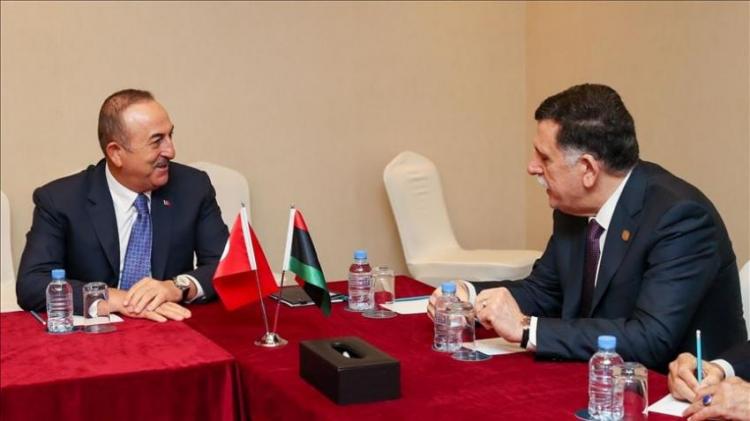Turkish delegation secretly visits Libya
ISTANBUL, Turkey (North Press) – Last week, a Turkish delegation consisting of the foreign and finance ministers, in addition to the spokesperson for the Turkish president and the head of the General Intelligence visited Tripoli. This visit raised many questions, especially as it was carried out with strict confidentiality.
The visit was not disclosed until after the Turkish delegation arrived in Tripoli and met with the head of the Government of National Accord Fayez al-Sarraj.
Turkish diplomats claimed that the short visit was very important, that it aimed to provide support and assistance to the Libyan people, and endeavored to strengthen Libya economically, militarily, and in terms of security.
Confidentiality
Turkish political analyst, Muhannad Oglu, told North Press that “the visit was not revealed due to media security reasons, based on fear of infiltration by pro-Haftar members.”
Observers believe that the visit, which was announced later, shows that Turkey is beginning to achieve the results of its military intervention in Libya, and it wants to obtain economic gains before the military ones.
Activation of the security agreement
.
"The Turkish delegation came to Libya to activate the security agreement concluded between Saraj and Erdogan, which includes the establishment of Turkish military bases in Libyan territory. Turkish forces have started arriving in Libya under the pretext of mine clearance, some of which are located at Wattia military base in western Libya,” politician Muhammad Zubaidi told North Press.
Zubaidi noted that "Turks began to establish a naval base in the city of Misrata because it has five ports, and one of those ports was converted into a naval base for the Turks, making the Turkish presence clear to the public."
"The Turks want to get the most of Libyan money. When al-Sarraj held a press conference with Erdogan last year, he talked about compensation for Turkish companies at a value of 2.5 billion dollars as a result of the conflict in Libya. Now they have
concluded new agreements with the Turks, according to which Turkish companies will enter to build power stations. This is to legitimize the theft of Libyan funds to support the Turkish currency and economy, which has begun to collapse."
Turkish opposition sources spoke to the media, saying, "The Turkish government intends to stay in Libya for a long time with economic and military projects, and started to use two military bases there."
"Turkey ignores Arab and Western criticism and warnings, and even ignores the decision to ban arms exports to Libya," the sources added.
“With everything that it implies, the western part of Libya, which is controlled by the Government of National Accord, is converted to an Ottoman province. This is in addition to talking about the presence of the Turkish community within the structure of the Libyan society. Erdogan mentioned that there are a million and a half Libyans of Turkish origin. Sheikh Ali al-Sallabi, religious scholar and Islamist politician in Libya, stated to the media that all the residents of Misrata were of Turkish origin,” Zubaidi said.
Inflammatory speech
He added that there is inflammatory speech regarding Libyan tribes and the rest of the Libyan people, with Turkey claiming that they are common rabble and shepherds who cannot rule their country, and that they can only succeed through the Turkish community and the remains of the Turks in Libya.
Zubaidi warned of the consequences of the Turkish intervention in Libya, saying, "Now the Turks are deployed in Libya, while the Arab countries are watching the resounding fall of a member state of the Arab League and a country whose location is central between the eastern and western Arab nations."
Turkish sources made it clear that in addition to Turkey's intention to establish military bases and use others in Libya, it intends to find and refine oil in Libya. This will increase criticism against Turkey and may lead to events, the most prominent of which is the settling of international scores on the Libyan scene, which Libyan people may suffer from in the coming days.

